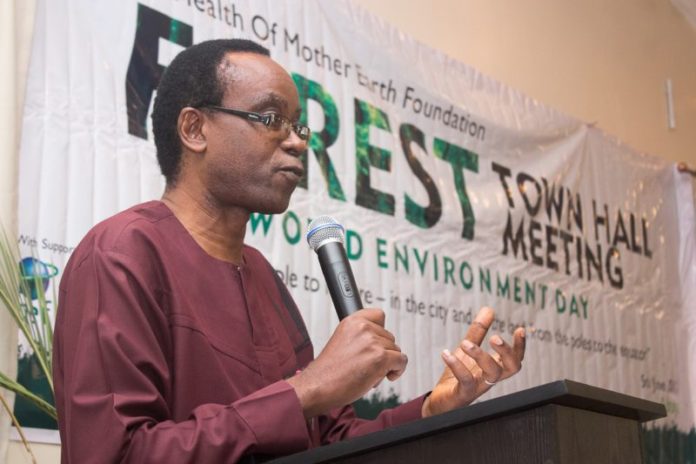By Nnimmo Bassey
The 25th Conference of Parties (COP) of the United Nations Framework Convention on Climate Change (UNFCCC) entered its second week with the fog over the Paris Agreement deepening.
The negotiations have been everything but expected but then again not surprising if one has been following the agenda of the global north over the years in climate talks. As the climate justice movement had anticipated, the global north, led by the United States, the European Union, Canada and Australia among others have obstructed the global south in all agendas including Article 6 of the Paris Agreement, finance, adaptation, mitigation, loss and damage, and transparency.
It’s quite clear that as the Trump administration perfects plans to opt out of the climate negotiations they plan to abandon sink as it is going down. They forget that this is one ship that no one can opt out of.
The US, Australia and other countries of the global north are now more than ever pushing for false solutions embedded in Articles 6.2 and 6.4 of the Paris Agreement that centre on carbon markets and offsets with no safe guards because they, in addition to the massive fossil fuel corporations they protect, know they will benefit most from the schemes.
Article 6 deals with what is called cooperative approaches among Parties, and includes the use of market and non-market mechanisms. The rule for the implementation of this article was to have been adopted at COP24 in Poland but an agreement could not be reached on its interpretation.
Speaking on Article 6, the Chair of the Group of 77 said that negotiations on this matter “are difficult, contentious and complex, this agenda item should be concluded in a manner that ensures that there is a balanced outcome under Articles 6(2) and 6(4) as well as 6(8) that reflect the diversity of Nationally Determined Contributions (NDCs), ensures environmental integrity, avoids double counting, promotes sustainable development, provides adequate and predictable funds for adaptation, and enables future cooperative arrangements among Parties through the nationally appropriate use of both market and non-market approaches”. He also added that the Group of 77 viewed “the cynicism shown by major partners towards multilateralism and the international rules-based order as a whole as a serious challenge that could undermine our collective efforts and interests… “We have an obligation to act responsibly and to be guided by our joint interests and the science. Unilateralism, isolationism, and pseudo-science threaten our efforts and we have a responsibility to ensure that they do not hijack our ongoing efforts.”
Those were strong words. It could not be otherwise. During COP24 an official of one of the top oil companies in the world had boasted that they had helped frame the wordings of parts of the contentious Article. This has reinforced the basis for calling for the exclusion of polluters from the COP because they have only bad influence on the process.
We must remind ourselves that capitalist development since the 19th century has been powered by coal, oil and gas. We must keep in view that fossil fuels account for nearly 90 percent of all carbon dioxide emissions. It is also known that of the almost 2 trillion barrels of known crude oil reserves, two-thirds of that must remain unburned if the earth is not to warm beyond acceptable limits. Of the known reserves of almost 200 trillion cubic metres of gas and 900,000 million tons of coal, two-thirds must be left unburned.
The climate justice movement has in the last four years called out countries of the global North for permitting these injustices. It’s sad enough that market mechanisms are not a real solution to climate change but believing that market mechanisms will earn them money from the so-called offsets is even more disturbing. The global south is being reminded that they did not get anything from Clean Development Mechanisms (CDM) hence they would be operating in foolery to expect to gain from market mechanism especially in the current state of the text that has no safeguards and no transparency mechanism.
The global north has also made it clear that they do not intend to pay their historical debt much less for their continued pollution and hence have blocked and gagged all talks on finance.
Loss and damage is yet another item that has left many wondering what is left of the Paris agreement if polluters cannot be held liable for their actions.
The global south has been left under the mercy of its tax payers and meagre consolidated funds to mitigate whatever climate crisis that will come their way which they have done little to contribute to.
Pessimism Growing
In the build-up to the COP, the UNFCCC had vigorously tried to build optimism around the processes, but their efforts do not appear to have lit any fires. The theme declares “Time for Action”, but there is no sign that nations are ready to act in a way that is in consonance with science and the social realities of the people.
The COP venue is generally languid although actions by civil society groups stir some excitement and strong statements. On the whole, delegates and observers are pessimistic that the COP will come through with such meaningful action that would stop the rising tide of climate emergency in its tracks.
Just before the doors of the conference opened, The Pope sent a message to the world that the church was considering adding ecological sins to its doctrine. Polluters and climate deniers certainly would not applaud such an engagement of the church in what they consider purely secular matters. However, we cannot but accept that irreversible ecological damage or ecocide, is not only a crime against humanity but also affects our spiritual wellbeing.
In a letter written to leaders at COP25, the Pope expressed his view that four years after the Paris Agreement the urgency needed to tackle the climate emergency does not appear to have caught on with governments. He also stated that there is no clarity on how the costs of tackling the menace will be distributed. He wondered if there was the needed political will to face this crisis.
The UNFCCC has so far avoided taking on the need to keep fossils in the ground even though its own reports show that there must be a phase out of the dirty fuels. Civil society groups led by Oilwatch International have called for fossils to be left in the ground right from late 1990s. At COP 21 and again at COP25, the group proposed that communities, territories and nations that keep fossils in the ground should be applauded for taking real climate action.
Considering that powerful nations have the tendency to ignore historical and current climate obligations and are even ready to walk away from global commitments, it is time to team up with such communities and nations and shift away from dirty energy sources. Their sacrifices could also possibly pay for the ecological sins of repentant eco-devourers. Their actions could also help bring climate outlaws to book.













